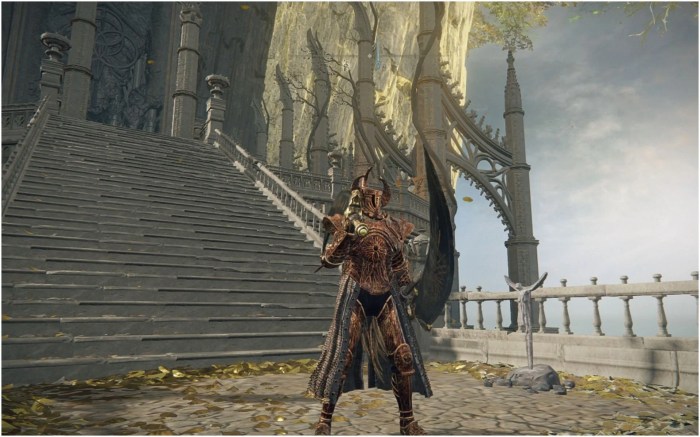Elden ring strength vs dex – In Elden Ring, the choice between Strength and Dexterity is a crucial one that can significantly impact your playstyle and effectiveness in combat. Both attributes offer unique advantages and disadvantages, and understanding their nuances is essential for optimizing your character build.
Strength governs the power of your physical attacks and the effectiveness of heavy weapons, while Dexterity enhances your agility, finesse, and the damage output of lighter, faster weapons.
Strength vs Dexterity in Elden Ring: An Overview: Elden Ring Strength Vs Dex

In Elden Ring, Strength and Dexterity are two fundamental attributes that govern character performance. Strength primarily influences the damage output of weapons that require physical strength to wield, while Dexterity enhances the speed, finesse, and critical hit rate of weapons designed for agility and precision.
Weapons that scale primarily with Strength include colossal swords, great axes, and heavy hammers, which excel in delivering devastating blows. On the other hand, weapons that favor Dexterity include katanas, rapiers, and daggers, which offer quick attacks and a higher chance of inflicting critical hits.
Scaling and Damage Output
Weapons in Elden Ring scale with different attributes, and the scaling mechanics determine how effectively they utilize those attributes to enhance their damage output. Weapons with higher scaling in Strength or Dexterity will gain more damage as those attributes increase.
For example, a colossal sword with a C scaling in Strength will gain a moderate amount of damage for each point invested in Strength, while a katana with an A scaling in Dexterity will gain a significant amount of damage for each point invested in Dexterity.
Weapon Variety and Choices
| Weapon Type | Primary Scaling | Advantages | Disadvantages |
|---|---|---|---|
| Colossal Swords | Strength | High damage, poise damage | Slow attack speed, high stamina consumption |
| Great Axes | Strength | High damage, area of effect attacks | Slow attack speed, limited reach |
| Heavy Hammers | Strength | Very high damage, stagger potential | Extremely slow attack speed, high stamina consumption |
| Katanas | Dexterity | Quick attacks, high critical hit rate | Lower damage compared to Strength weapons, less poise damage |
| Rapiers | Dexterity | Very high critical hit rate, quick attacks | Very low damage, limited range |
| Daggers | Dexterity | Extremely high critical hit rate, quick attacks | Very low damage, extremely limited range |
Hybrid Builds: Combining Strength and Dexterity

While specializing in either Strength or Dexterity can yield potent results, hybrid builds that combine both attributes can also be effective in Elden Ring. Hybrid builds allow players to wield a wider variety of weapons and adapt to different situations.
For example, a hybrid build could use a colossal sword for high damage against large enemies, while switching to a katana for quick attacks against smaller, more agile enemies.
Stat Requirements and Optimization, Elden ring strength vs dex

| Weapon/Spell | Strength Requirement | Dexterity Requirement |
|---|---|---|
| Colossal Sword | 40 | 12 |
| Great Axe | 30 | 10 |
| Heavy Hammer | 50 | 15 |
| Katana | 12 | 40 |
| Rapier | 10 | 30 |
| Dagger | 5 | 25 |
Optimizing stat allocation depends on the specific weapon choices and playstyle. For a Strength build, it’s recommended to prioritize Strength and invest minimally in Dexterity for weapon requirements. Conversely, for a Dexterity build, it’s advisable to prioritize Dexterity and invest minimally in Strength.
Talismans and Equipment
- Radagon’s Soreseal: Enhances Strength, Dexterity, Intelligence, and Faith, but increases damage taken.
- Godrick’s Great Rune: Increases all attributes, including Strength and Dexterity.
- Marika’s Soreseal: Enhances Strength and Dexterity, but increases damage taken and FP cost.
- Shard of Alexander: Enhances Strength and damage dealt by skills.
- Rotten Winged Sword Insignia: Enhances Dexterity and damage dealt by successive attacks.
Situational Advantages and Disadvantages

The choice between Strength and Dexterity can be influenced by specific scenarios and enemy encounters.
- Against large enemies: Strength weapons excel due to their high damage and poise damage, making them effective for breaking enemy defenses.
- Against smaller, agile enemies: Dexterity weapons are more effective due to their quick attacks and higher critical hit rate, allowing players to quickly stagger and defeat these enemies.
- In PvP combat: Both Strength and Dexterity weapons have their advantages. Strength weapons can deal devastating blows and poise damage, while Dexterity weapons offer quick attacks and the ability to inflict critical hits, making them more effective against skilled opponents.
Answers to Common Questions
Q: What is the difference between Strength and Dexterity in Elden Ring?
A: Strength increases the damage of heavy weapons and physical attacks, while Dexterity enhances the damage of lighter weapons, casting speed, and agility.
Q: Which attribute is better for melee combat?
A: Both Strength and Dexterity can be effective for melee combat, depending on your weapon choice. Strength is ideal for heavy weapons like greatswords and axes, while Dexterity suits faster weapons like katanas and daggers.
Q: Can I respec my attributes later in the game?
A: Yes, you can respec your attributes using a Larval Tear, which allows you to redistribute your attribute points.
